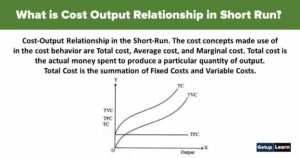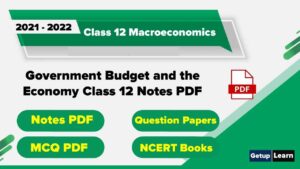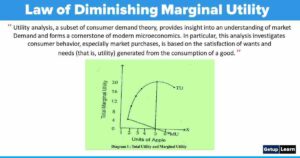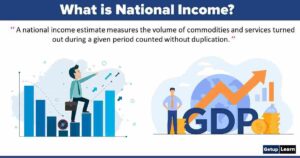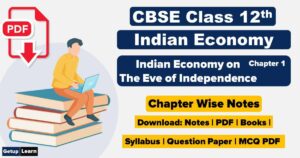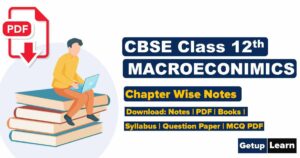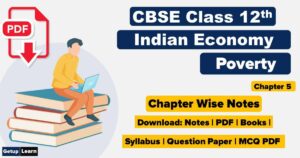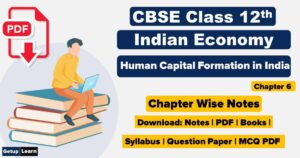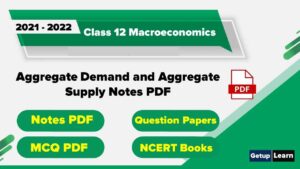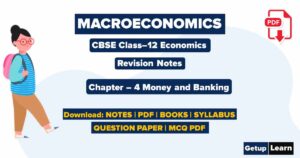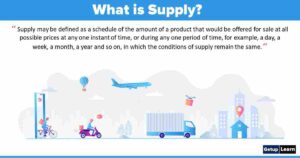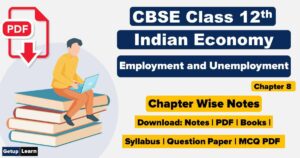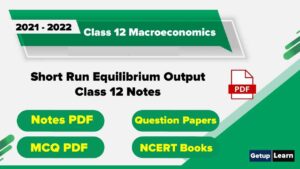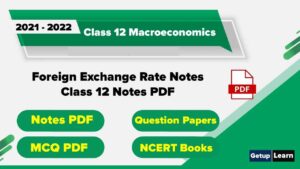Indian Economy Class 12 is an interesting subject. In Indian Economy Class 12, we will study about past of the Indian economy and various topics which are concepts of Indian Economy, Indian Economy on the Eve of Independence, Economic Reforms Since 1991, Liberalisation Privatisation and Globalisation, Poverty, Human Capital Formation in India, Rural Development, Employment and Unemployment, Infrastructure, Environment and Sustainable Development, Comparative Development Experiences of India and Its Neighbours etc. Download free CBSE Indian Economy Class 12 revision notes.
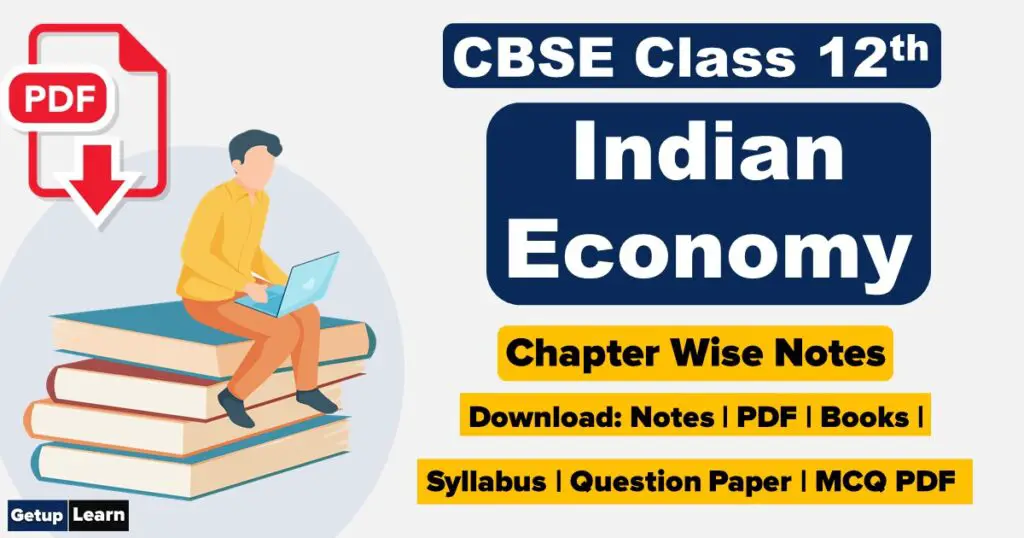
Students can learn various fundamental concepts about the indian economy in Class 12 Indian economy if they understand the complex terms and basic concepts in easy language, so they can make a strong foundation. To help students perform well in the Class 12 Indian economy exam and give them a better understanding of all the crucial concepts of this subject, nothing can be better than well explained and structured indian economy revision notes in class 12.
Our expert prepared these Indian economy class 12 notes based on the latest CBSE syllabus as well as the Class 12 board exam pattern. Class 12th Indian economy notes will provide the students with a complete overview and understanding of all the chapters with the broad coverage of important topics from every chapter that has high marks weightage in the exam for the better score of students.
Table of Contents
CBSE Indian Economy Class 12 Notes PDF Chapter Wise
CBSE Indian economy class 12 notes pdf chapter wise followed by NCERT guidelines:
| Chapters | Indian Economy Class 12 Notes PDF | |
| 1. | ????Indian Economy on the Eve of Independence | |
| 2. | ????Indian Economy 1950-1990 | |
| 3. | ????Economic Reforms Since 1991 | |
| 4. | ????Liberalisation Privatisation and Globalisation | |
| 5. | ????Poverty | |
| 6. | ????Human Capital Formation in India | |
| 7. | ????Rural Development | |
| 8. | ????Employment and Unemployment | |
| 9. | ????Infrastructure | |
| 10. | ????Environment and Sustainable Development | |
| 11. | ????Comparative Development Experiences of India and Its Neighbours |
Class 12 Macro Economics Notes PDF Chapter Wise
CBSE class 12 notes for macroeconomics followed by NCERT guidelines:
| Chapters | Macroeconomics |
| 1. | ????Introduction to Macroeconomics and Basic Concepts |
| 2. | ????National Income and Related Aggregates |
| 3. | ????Methods of Calculating National Income |
| 4. | ????Money and Banking |
| 5. | ????Aggregate Demand and Supply |
| 6. | ????Short Run Equilibrium Output |
| 7. | ????Foreign Exchange Rate |
| 8. | ????Government Budget and the Economy |
| 9. | ????Balance of Payments |
You can download the revision notes of macroeconomics class 12th. These notes are free to download you can easily download the macroeconomics class 12 notes pdf.
CBSE Indian Economy Class 12 Notes | Syllabus
Cbse indian economy class 12 notes revision notes are available to access both offline in PDF and online format as well. Our team prepared these revision notes of indian economy as per the latest syllabus of CBSE. The teachers we have here are well experienced and have prepared these notes, seriously based on concepts followed by CBSE from the past several years.
Cbse indian economy class 12 notes help you to understand the subject and will clear all your concepts. Each chapter concept or topic explained very well helps with graphical representation. Download Cbse indian economy class 12 notes pdf free.
Cbse Indian Economy Class 12 Syllabus
This is cbse indian economy class 12 syllabus which is based on guidelines of CBSE:
Unit I : Development Policies and Experience (1947-1990)
Chapter 1: Indian Economy on the Eve of Independence
- Low Level of Economic Development Under the Colonial Rule
- Agricultural Sector
- Industrial Sector
- Foreign Trade
- Demographic Condition
- Occupational Structure
- Infrastructure
Chapter 2 : Indian Economy 1950-1990
- The Goals of Five Year Plans
- Agriculture 22
- Industry and Trade
- Trade Policy: Import Substitution
Unit II : Economic Reforms Since 1991
Chapter 3 : Liberalisation, Privatisation and Globalisation
- Background
- Liberalisation
- Privatisation
- Globalisation
- Indian Economy During Reforms
Unit III: Current Challenges Facing the Indian Economy
Chapter 4 : Poverty
- Who Are the Poor?
- How Are Poor People Identified?
- The Number of Poor in India
- What Causes Poverty?
- Policies and Programmes Towards Poverty Alleviation
- Poverty Alleviation Programmes
Chapter 5 : Human Capital Formation in India
- What Is Human Capital?
- Sources of Human Capital
- Human Capital and Human Development
- State of Human Capital Formation in India
- Education Sector in India
- Future Prospects
Chapter 6 : Rural Development
- What Is Rural Development?
- Credit and Marketing in Rural Areas
- Agricultural Market System
- Diversification Into Productive Activities
- Sustainable Development and Organic Farming
Chapter 7 : Employment and Unemployment
- Workers and Employment
- Participation of People in Employment
- Self-employed and Hired Workers
- Employment in Firms, Factories and Offices
- Growth and Changing Structure of Employment
- Informalisation of Indian Workforce
- Unemployment
- Government and Employment Generation
Chapter 8 : Infrastructure
- What Is Infrastructure?
- Relevance of Infrastructure
- The State of Infrastructure in India
- Energy
- Health
Chapter 9 : Environment and Sustainable Development
- Environment
- Definition and Functions
- State of India’s Environment
- Sustainable Development
- Strategies for Sustainable Development
Unit IV : Development Experiences of India: A Comparison With Neighbours
Chapter 10 : Comparative Development Experiences of India and Its Neighbours
- Developmental Path
- A Snapshot View
- Demographic Indicators
- Gross Domestic Product and Sectors
- Indicators of Human Development
- Development Strategies
CBSE Indian Economy Class 12 Syllabus Marking Scheme as per 2021-22
This is the cbse indian economy class 12 syllabus marking scheme as per 2021-22 under guidelines of CBSE:
| Units | Chapters | Marks | Periods |
| Part A | Introductory Macroeconomics | ||
| Unit 1 | National Income and Related Aggregates | 12 | 30 |
| Unit 2 | Money and Banking | 6 | 15 |
| Unit 3 | Determination of Income and Employment | 10 | |
| Unit 4 | Government Budget and the Economy | 6 | |
| Unit 5 | Balance of Payments | 6 | |
| Total = | 40 | 100 | |
| Part B | Indian Economic Development | Marks | Periods |
| Unit 6 | Development Experience (1947-90) and Economic Reforms since 1991 | 12 | 28 |
| Unit 7 | Current Challenges facing Indian Economy | 22 | 60 |
| Unit 8 | Development Experience of India – A Comparison with Neighbours | 06 | 12 |
| Theory Paper (40+40 = 80 Marks) | 40 | 100 | |
| Part C | Project Work | 20 | 20 |
| Total Marks = | 100 |
What are the chapters in Indian Economy Class 12?
These are the chapter of Indian Economy Indian Economy on the Eve of Independence, Economic Reforms Since 1991, Liberalisation Privatisation and Globalisation, Poverty, Human Capital Formation in India, Rural Development, Employment and Unemployment, Infrastructure, Environment and Sustainable Development, Comparative Development Experiences of India and Its Neighbours etc.
How many books of economics are there in class 12?
There are two books in economics class 12 Macroeconomics and Indian Economy.

